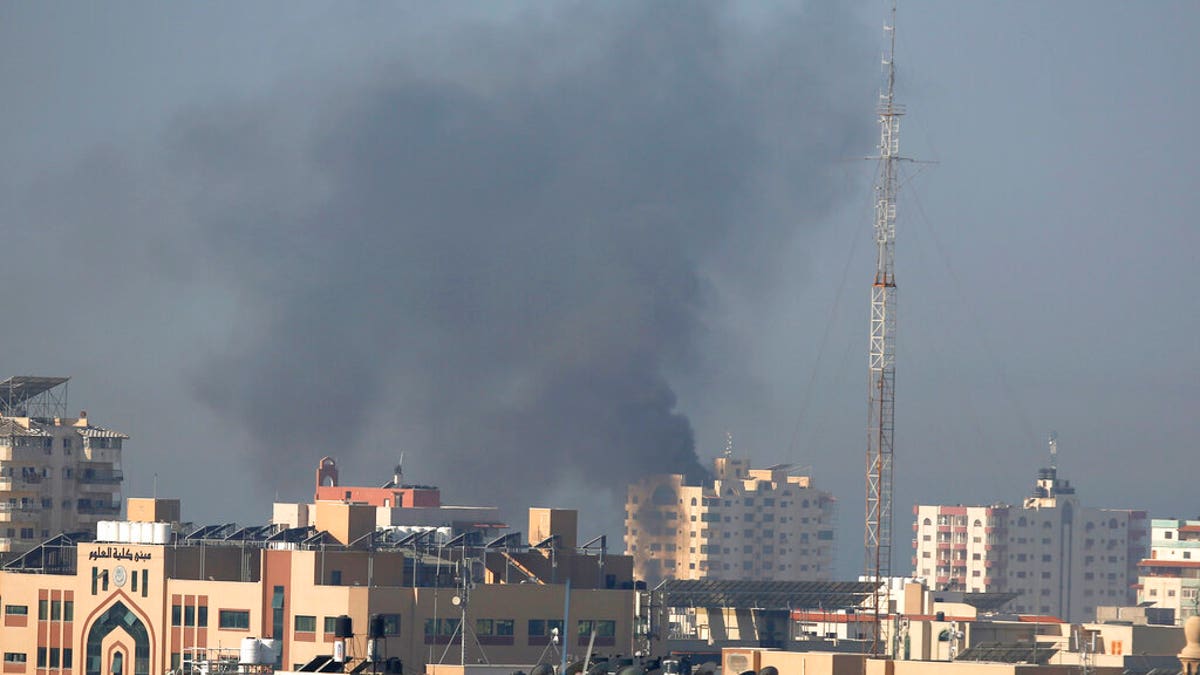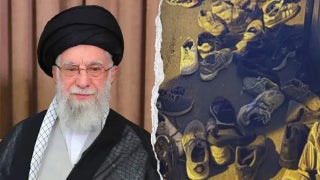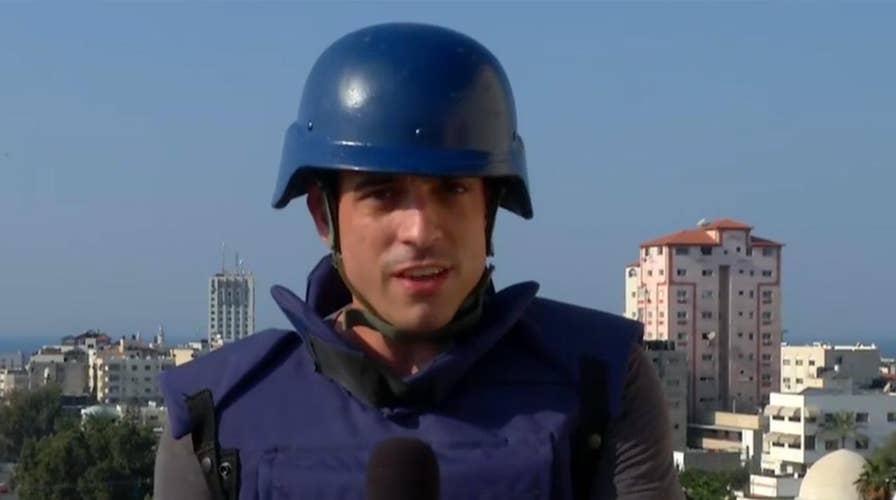Israel pounding Gaza with airstrikes
Trey Yingst is caught in the crossfire in Gaza where attacks are escalating following the assassination of an Islamic jihad commander
Militants in Gaza sent a barrage of at least 50 rockets over the border into Tel Aviv early Tuesday, vowing further revenge after the Israeli military carried out a pair of targeted airstrikes on senior Islamic jihad commanders in Gaza and in Syria.
“The response to this crime will have no limits,” Islamic Jihad said in a statement.
ERDOGAN THREATENS EU WITH ISIS PRISONERS
An Israeli airstrike killed Bahaa Abu el-Atta and his wife in their home in eastern Gaza Tuesday, Lt. Col. Jonathan Conricus, a military spokesman, said. The target was a "ticking time bomb" responsible for a number of recent rocket attacks on southern Israel and claimed that he was actively planning new attacks, Conricus said.
"We essentially, over the last week, have been waiting for the opportune moment to conduct this surgical strike," he said. Conricus added the airstrike had destroyed only the floor of the building in the Shejaeya neighborhood, in the eastern part of Gaza City, to minimize "collateral damage."
Minutes after the Iran-backed Palestinian group confirmed the death, barrages of rockets were fired toward Israel. Air raid sirens continued to go off throughout the morning as far as Tel Aviv. In one instance, a rocket landed on a highway, meters from a passing vehicle.
The military said more than 50 rockets were fired in just a few hours, with 20 intercepted by Israel's Iron Dome defense system. There were no Israeli casualties. Israel shut down crossing points into Gaza and reduced the permissible fishing area off the territory's coast to 6 nautical miles. Schools were closed, and people were instructed to stay home in communities stretching from the Gaza border all the way to Tel Aviv, about 55 miles away. Public shelters were opened and restrictions placed on large gatherings.
At least two people were injured from the rockets, including an 8-year-old girl who was left in critical condition and lost consciousness while running to a bomb shelter, The Wall Street Journal reported.

Nov. 12: Smoke rises after an Israeli forces strike in Gaza City. Israel killed a senior Islamic Jihad commander in Gaza early Tuesday in a resumption of pinpointed targeting that threatens a fierce round of cross-border violence with Palestinian militants. (AP Photo/Hatem Moussa)
Israel had no further plans to resume its assassinations of militant leaders — a practice that in the past has triggered heavy fighting. "There was no other choice," Conricus said.
But by midmorning, the army said it struck two Islamic Jihad militants from the group's rocket-launching unit. It claimed a direct hit but gave no further details. The Gaza Health Ministry said a Palestinian man was killed and another wounded in that strike. One of the rockets from Gaza hit a residential house in Netivot in southern Israel, penetrating the roof of the home, the army said. No one was hurt.
Syrian officials said another Israeli airstrike in Damascus targeted another Islamic Jihad commander, Akram al-Ajouri, who was not harmed. Israeli warplanes fired three missiles at al-Ajouri's home, killing his son and granddaughter, according to Syria's state-run news agency. The Israeli military had no comment.
A military official in Damascus said Israeli warplanes fired three missiles toward the Syrian capital, with one being destroyed by Syria's air defenses before reaching its target, according to the Associated Press. The two others struck the home of al-Ajouri, the official said. A second man identified as Abdullah Yousef Hassan was killed and nine civilians wounded, the unidentified official said according to Syrian state media.
The sudden surge in violence looked to awaken Israel's increasingly open conflict with Iran and its proxies in the region. Prime Minister Benjamin Netanyahu has issued a series of warnings recently about alleged Iranian aggression.
Netanyahu also has been criticized by southern border residents and political rivals for a tepid response to recent militant attacks. Netanyahu's Security Cabinet was holding an emergency meeting to discuss further action.
The airstrikes come at a tenuous time politically for Israel, as Netanyahu leads a caretaker government after two inconclusive elections. His chief challenger, former military chief Benny Gantz, is currently trying to build a coalition government of his own. Gantz said the airstrike was "the right decision."
A successful military operation could bolster Netanyahu as he seeks to hold onto power — especially if he is indicted on corruption charges.
Israel frequently strikes Iranian interests inside Syria and has carried out hundreds of airstrikes in the course of Syria's civil war, now in its ninth year. Tuesday's attack, however, was a rare assassination attempt of a Palestinian militant in the Syrian capital.
Just this week Netanyahu appointed hard-line politician Naftali Bennett as Israel's new defense minister to fortify his political base. Bennett has long advocated tougher action against Palestinian militants. But he hasn't taken office yet and the military said the operation had been planned long in advance.
The operation appeared to have wide backing despite the fraught political climate and Israel's ceremonial president, who has been working to establish a unity government between Netanyahu and Gantz, called for it not to enter the fray.
"We stand behind the security forces, who have been working for the success of this morning's operations for a long time," said President Reuven Rivlin. "This is no time for political squabbles."
Since Hamas took over Gaza by force in 2007 from the internationally backed Palestinian Authority, Israel and Gaza militants have fought three wars, with the third in 2014 lasting for 50 days. Short-but-frequent spasms of violence have occurred, the latest earlier this month when about 10 projectiles were fired at Israel, which accused Abu el-Atta of being behind them.
The Associated Press contributed to this report.








































